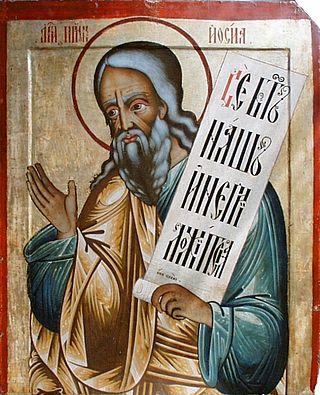
In the Hebrew Bible, Hosea, also known as Osee, son of Beeri, was an 8th-century BCE prophet in Israel and the nominal primary author of the Book of Hosea. He is the first of the Twelve Minor Prophets, whose collective writings were aggregated and organized into a single book in the Jewish Tanakh by the Second Temple period but which are distinguished as individual books in Christianity. Hosea is often seen as a "prophet of doom", but underneath his message of destruction is a promise of restoration. The Talmud claims that he was the greatest prophet of his generation. The period of Hosea's ministry extended to some sixty years, and he was the only prophet of Israel of his time who left any written prophecy.
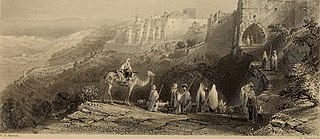
Matthew 2:6 is the sixth verse of the second chapter of the Gospel of Matthew in the New Testament. The magi have informed King Herod that they had seen portents showing the birth of the King of the Jews. Herod has asked the leading Jewish religious figures about how to find out where Jesus was to be born. In this verse they tell him by quoting from the Book of Micah.
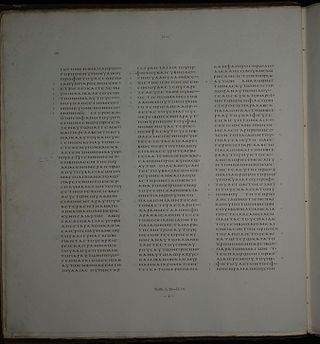
Matthew 2 is the second chapter of the Gospel of Matthew in the New Testament. It describes the events after the birth of Jesus, the visit of the magi and the attempt by King Herod to kill the infant messiah, Joseph and his family's flight into Egypt, and their later return to live in Israel, settling in Nazareth.
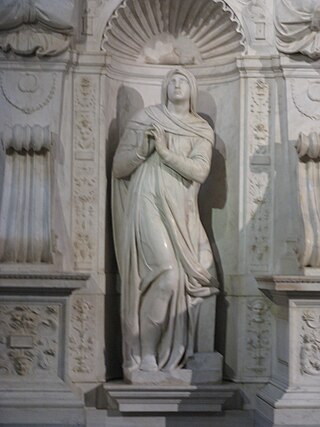
Matthew 2:18 is the eighteenth verse of the second chapter of the Gospel of Matthew in the New Testament. Herod has ordered the Massacre of the Innocents and this verse quotes from the Book of Jeremiah to show that this event was predicted by the prophets.
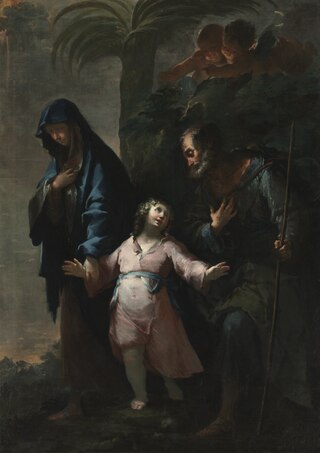
Matthew 2:23 is the twenty-third verse of the second chapter of the Gospel of Matthew in the New Testament. The young Jesus and the Holy Family have just returned from Egypt and in this verse are said to settle in Nazareth. This is the final verse of Matthew's infancy narrative.
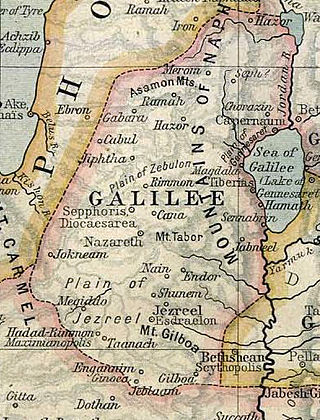
Matthew 4:14–15 are the fourteenth and fifteenth verses of the fourth chapter of the Gospel of Matthew in the New Testament. In the previous verses Jesus returned to Galilee after hearing of the arrest of John the Baptist and then left Nazareth for Capernaum. These introduce and then contain the first portion of a quote from the Book of Isaiah showing how these movements were preordained by scripture.

Matthew 4:16 is the sixteenth verse of the fourth chapter of the Gospel of Matthew in the New Testament. In the previous verses Jesus returned to Galilee after hearing of the arrest of John the Baptist and then left Nazareth for Capernaum. This verse contains the second half of a quote from the Book of Isaiah, implying that these movements were preordained by scripture.

The flight into Egypt is a story recounted in the Gospel of Matthew and in New Testament apocrypha. Soon after the visit by the Magi, an angel appeared to Joseph in a dream telling him to flee to Egypt with Mary and the infant Jesus since King Herod would seek the child to kill him. The episode is frequently shown in art, as the final episode of the Nativity of Jesus in art, and was a common component in cycles of the Life of the Virgin as well as the Life of Christ. Within the narrative tradition, iconic representation of the "Rest on the Flight into Egypt" developed after the 14th century.

The Angel of the Lord is an entity appearing repeatedly in the Hebrew Bible on behalf of the God of Israel.
Matthew 9:13 is a verse in the ninth chapter of the Gospel of Matthew in the New Testament.
The books of the New Testament frequently cite Jewish scripture to support the claim of the Early Christians that Jesus was the promised Jewish Messiah. Scholars have observed that few of these citations are actual predictions in context; the majority of these quotations and references are taken from the prophetic Book of Isaiah, but they range over the entire corpus of Jewish writings.
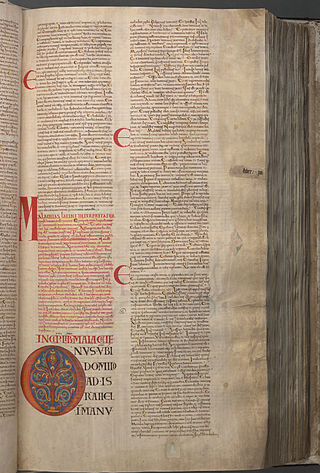
Malachi 4 is the fourth chapter of the Book of Malachi in the Hebrew Bible or the final chapter in the Old Testament of the Christian Bible. This book contains the prophecies attributed to the prophet Malachi, and is a part of the Book of the Twelve Minor Prophets.
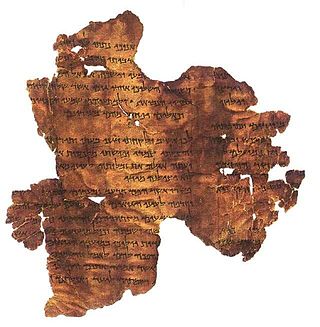
Hosea 1 is the first chapter of the Book of Hosea in the Hebrew Bible or the Old Testament of the Christian Bible. This book contains the prophecies attributed to the prophet Hosea, son of Beeri, and this chapter especially sets forth the spiritual whoredom of Israel by symbolical acts. It is a part of the Book of the Twelve Minor Prophets.
Isaiah 9 is the ninth chapter of the Book of Isaiah in the Hebrew Bible or the Old Testament of the Christian Bible. This book contains the prophecies attributed to the prophet Isaiah, and is one of the Nevi'im.

Hosea 2 is the second chapter of the Book of Hosea in the Hebrew Bible or the Old Testament of the Christian Bible. This book contains the prophecies attributed to the prophet Hosea, son of Beeri, and this chapter contains the application of the symbols in the first chapter. It is a part of the Book of the Twelve Minor Prophets.

Hosea 7 is the seventh chapter of the Book of Hosea in the Hebrew Bible or the Old Testament of the Christian Bible. In the Hebrew Bible it is a part of the Book of the Twelve Minor Prophets. The book contains the prophecies attributed the prophet Hosea, son of Beeri, and this chapter is about Israel reproved for multiple sins resulting in God's wrath against them for their hypocrisy.

Hosea 11, the eleventh chapter of the Book of Hosea in the Hebrew Bible or the Old Testament of the Christian Bible, has been called "one of the high points in the Old Testament". In the Hebrew Bible is a part of the Book of the Twelve Minor Prophets. According to the Jamieson-Fausset-Brown Bible Commentary, this chapter contains prophecies attributed to the prophet Hosea, son of Beeri, about God's former benefits, and Israel's ingratitude resulting in punishment, but God still promises restoration.

Hosea 12 is the twelfth chapter of the Book of Hosea in the Hebrew Bible or the Old Testament of the Christian Bible. In the Hebrew Bible it is a part of the Book of the Twelve Minor Prophets. This chapter contains prophecies attributed to the prophet Hosea, son of Beeri, delivered about the time when the Kingdom of Israel (Ephraim) sought the aid of the Egyptian king So, in violation of her covenant with Assyria. References to contemporary events sit alongside allusions to the patriarchal age in Israel's history. Hosea exhorts the country's leaders to follow their father Jacob's persevering prayerfulness, "which brought God's favor upon him". The Jamieson-Fausset-Brown Bible Commentary notes that "as God is unchangeable, He will show the same favor to Jacob's posterity as He did to Jacob, if, like him, they seek God".

Hosea 13 is the thirteenth chapter of the Book of Hosea in the Hebrew Bible or the Old Testament of the Christian Bible. In the Hebrew Bible it is part of the Book of the Twelve Minor Prophets. The subject of this chapter and the following one is the idolatry of the Kingdom of Israel, referred to as Ephraim, notwithstanding God's past benefits, destined to be the country's ruin.

Jeremiah 31 is the thirty-first chapter of the Book of Jeremiah in the Hebrew Bible or the Old Testament of the Christian Bible. It is numbered as Jeremiah 38 in the Septuagint. The book contains prophecies attributed to the prophet Jeremiah, and is one of the Books of the Prophets (Nevi'im). This chapter is notable for the passage about the "New Covenant" (31:31-34) of God with His restored people and the quoting of 31:15 in the “Massacre of the Innocents" narrative. The Jerusalem Bible refers to chapters 30 and 31 as "the Book of Consolation", and Lutheran theologian Ernst Hengstenberg calls these two chapters "the triumphal hymn of Israel’s salvation".












